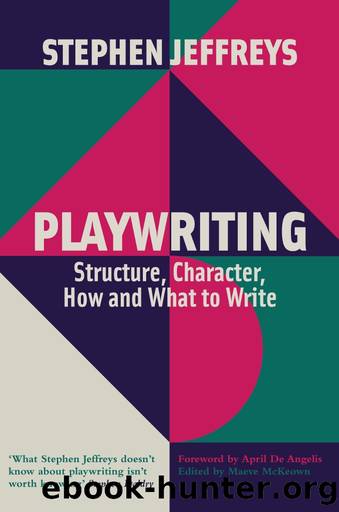Playwriting by Stephen Jeffreys

Author:Stephen Jeffreys [Jeffreys, Stephen]
Language: eng
Format: mobi
ISBN: 9781788501620
Publisher: Nick Hern Books
Published: 2019-04-17T16:00:00+00:00
Deductive and Inductive Logic
When you are buying a present for someone, how do you go about it? Do you think carefully about the person that you are buying the present for, make a list of things that they like and don’t like, decide what they would appreciate based on that, and then go out to a shop and buy it? Or do you start at one end of the high street, walk to the other end, browse in various shops and then pick something that feels right? The first method represents deductive logic and the second, inductive logic. Of course, both these ways of buying a present are caricatures, and what most of us do when we go Christmas shopping is have a list in mind, a few half-formed ideas about what people want, and then suddenly you strike lucky and see something that somehow corresponds to your ideas; you use both deductive and inductive thinking. However, when writing plays a lot of playwrights tend to get stuck in one or the other.
Deductive writers begin with an idea, a concept or an intellectual notion: ‘crime never pays’, for example, ‘power tends to corrupt’, ‘monetarism creates social decay’, ‘the culture of psychoanalysis leads to self-absorption’. They start with an idea that can be expressed clearly, and then build the action of the play in order to support the theory.
The advantage of this style of writing is that you know from the beginning exactly what the play is about, and so have very clear criteria about what it should include and what it shouldn’t. Writers like these are highly focused. But deductive writing results in thesis plays which try to prove things. And the downside of this method is that the characters may turn out simply to be puppets, mechanically obeying the whim of the dramatist. The end result is a play that may be assured about what it is saying but is rather lifeless. Also, the audience tends not to believe such characters or what they are doing, and therefore lacks interest in the results.
George Bernard Shaw wrote plays like this. The Devil’s Disciple is a good example of where this kind of thinking goes wrong. There are two main characters – Richard the ‘reprobate’ and Anthony Anderson, a vicar – and by the end of the play they have changed places. But you can’t believe a single word of it. It’s implausible that the man who is painted as the devil’s disciple, a traditional eighteenth-century rake, would become a vicar; and that the vicar would turn out to be a rogue. In the ‘thesis speech’ (see here) Anderson proclaims, ‘Sir: it is in the hour of trial that a man finds his true profession.’ The Devil’s Disciple represents the worst sort of deductive plays, which start with a distinctive thesis and then seek to prove it, even when it is highly improbable.
For more successful examples of this kind of writing, the films of Ken Loach are effective both politically and
Download
This site does not store any files on its server. We only index and link to content provided by other sites. Please contact the content providers to delete copyright contents if any and email us, we'll remove relevant links or contents immediately.
| Acting & Auditioning | Broadway & Musicals |
| Circus | Direction & Production |
| History & Criticism | Miming |
| Playwriting | Puppets & Puppetry |
| Stage Lighting | Stagecraft |
Call Me by Your Name by André Aciman(20516)
Ready Player One by Cline Ernest(14675)
How to Be a Bawse: A Guide to Conquering Life by Lilly Singh(7486)
Wiseguy by Nicholas Pileggi(5786)
The Kite Runner by Khaled Hosseini(5179)
On Writing A Memoir of the Craft by Stephen King(4944)
Audition by Ryu Murakami(4930)
The Crown by Robert Lacey(4817)
Call me by your name by Andre Aciman(4684)
Gerald's Game by Stephen King(4654)
Harry Potter and the Cursed Child: The Journey by Harry Potter Theatrical Productions(4506)
Dialogue by Robert McKee(4404)
The Perils of Being Moderately Famous by Soha Ali Khan(4220)
Dynamic Alignment Through Imagery by Eric Franklin(4217)
Apollo 8 by Jeffrey Kluger(3709)
The Inner Game of Tennis by W. Timothy Gallwey(3687)
Seriously... I'm Kidding by Ellen DeGeneres(3633)
How to be Champion: My Autobiography by Sarah Millican(3593)
Darker by E L James(3516)
